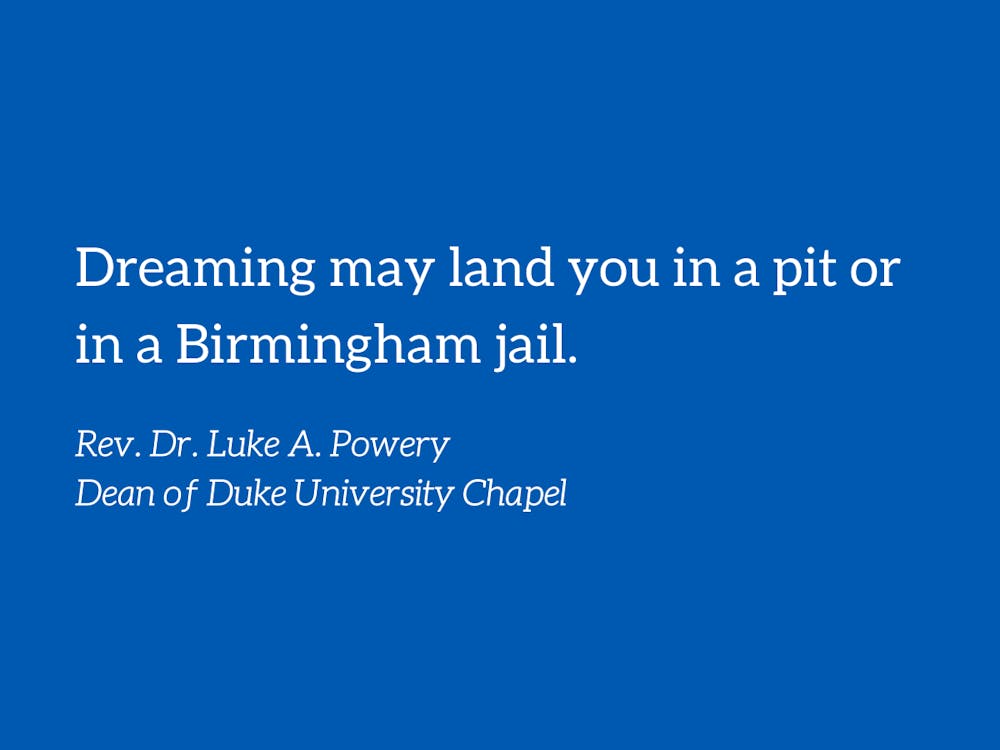Dreams can be fleeting and ephemeral, but there are also transformative dreams that birth new realities. These enduring dreams are worth holding onto and sacrificing for. The Bible describes dreams that are prophetic, such as Joseph’s dreams in the book of Genesis. His dreams of rising above his older brothers get him into trouble. At the age of 17, just when one is supposed to be dreaming of bright hopes of being accepted into Duke University, life is the pits for Joseph, literally, because his older brothers throw him into an empty pit. Why? His older brothers hate him because he’s a dreamer. His dreams make them want to destroy him—“we shall see what will become of his dreams,” they say.
Not everyone can handle our dreams. That might be the case because we dream what some experts on the science of dreams call a “big dream.” A dream that is too big can be dangerous. That’s because big dreams disrupt the way things are, imagining the ‘oughtness’ of life that transcends the ‘isness’ of reality. Big dreams may threaten the status quo and envision a new way of life. Dreaming may land you in a pit or in a Birmingham jail.
The Rev. Dr. Martin Luther King, Jr. was a dreamer who put his life at risk. He dreamed a world that disrupted and disturbed the status quo in society. In 1963, the same year Duke desegregated at the undergraduate level and admitted its first Black undergraduate students, at the March on Washington D.C. for Civil Rights before the Lincoln Memorial, Dr. King dreamed: “I have a dream that one day on the red hills of Georgia, sons of former slaves and sons of former slave-owners will be able to sit down together at the table of brotherhood. I have a dream that one day, even the state of Mississippi, a state sweltering with the heat of injustice, sweltering with the heat of oppression, will be transformed into an oasis of freedom and justice. I have a dream my four little children will one day live in a nation where they will not be judged by the color of their skin but by the content of their character…”
We may think Dr. King’s rhetorical corpus only includes this “I Have a Dream” speech, but he spoke of other dreams throughout his life. In a 1961 commencement address at Lincoln University, King spoke about “The American Dream,” and he said, “America is essentially a dream, a dream as yet unfulfilled.” He preached sermons titled “Shattered Dreams” (1959) and “Unfulfilled Dreams” (1968). He believed these kinds of dreams were “hallmark[s] of our mortal life.” Stanford University historian and King scholar, Clayborne Carson, was asked in an interview, “What messages do you think King would want to impress upon Americans today?” Carson replied, “He would want people to know that his Dream was still unfulfilled at the end of his life and remains unrealized even now.”
Dreamers know that some dreams will be unfulfilled in their lifetime or even shattered. King was honest and said that “few of us live to see our fondest hopes fulfilled.” But that didn’t stop him from dreaming; he still had the courage to dream. Dr. King’s dreams eventually led to his death and yet his dream is still on the playlist of this country’s historical memory.
So why should we dream? We dream because to dream is to live and not to dream is to die. A spiritual mentor for King, the Rev. Howard Thurman, a former dean of the chapels at Howard and Boston Universities, put it this way: “[We] cannot continue long to live if the dream in the heart has perished…Where there is no dream,.. life becomes a swamp, a dreary dead place and, deep within, [our] heart begins to rot…[The dream] is the ever-recurring melody in the midst of broken harmony and harsh discords of human conflict…It lives in the inward parts, it is deep within…for as long as a [person] has a dream in his heart, he cannot lose the significance of living.”
Your dreams may manifest in ways you never imagined. Your dreams may not have come true as of yet but they may just be delayed for the moment. Setbacks may just be setups for comebacks because dreamers don’t die easily. Like in Joseph’s case, his dream was deferred but it was not ultimately denied. He kept dreaming and eventually became the second-in-command in Egypt.
Dreams are bigger than diplomas. A 2014 Harvard Business Review article told readers how to have a year that counts saying, “start with your dreams.” Not your goals or plans or objectives, but your dreams. At the start of this new semester, start with your dreams—the unthinkable, the impossible, the questionable, the unorthodox, the risky. Imagine beyond what you see or experience. Dream even beyond yourself. A dream job is fine (you may have to pay off school loans!) but be courageous enough to dream a world with poet Langston Hughes who says this in “I Dream A World:”
I dream a world where all
Will know sweet freedom’s way,
Where greed no longer saps the soul
Nor avarice blights our day.
A world I dream where black or white,
Whatever race you be,
Will share the bounties of the earth
Dare to dream although dreams are not always welcomed. By dreaming, you may have to risk your life, or risk the way life is, but to dream is to live, so keep alive the dream in your heart.
Rev. Dr. Luke A. Powery is the Dean of Duke University Chapel. His column runs on alternate Mondays.
Get The Chronicle straight to your inbox
Signup for our weekly newsletter. Cancel at any time.

